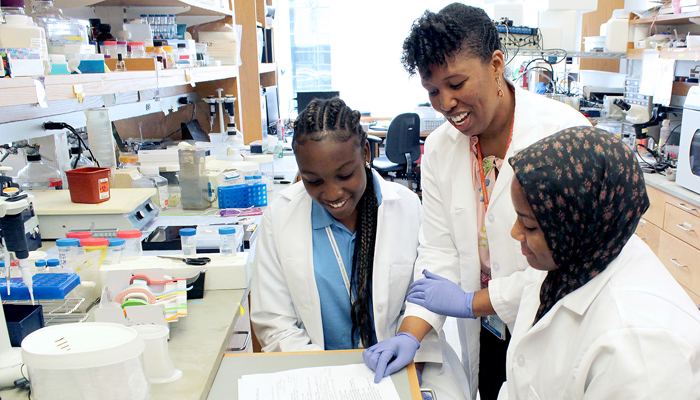HOW CAN WE HELP YOU? Call 1-800-TRY-CHOP
Building on a Decade of Commitment to Diversity in STEM-M Pipeline

It’s thrilling to see the moment when “the lightbulb goes on” in students and they can picture themselves working in translational medicine and doing research that has the potential to transform children’s health.
That moment came for Chitra Mosarla, MD, as one of the first undergraduate interns of CHOP’s Research Institute Summer Scholar Program (CRISSP), which celebrated its 10-year anniversary in 2021.
“It was a really phenomenal experience for me, and it definitely helped shaped my career,” said Dr. Mosarla, who is now a cardiology fellow at New York University. “You need the right people who give you the resources and encouragement.”
Children’s Hospital of Philadelphia Research Institute works tirelessly to nurture diverse students, from high schoolers to postdoctoral fellows, who have an interest in careers in science, technology, engineering, math, and medicine (STEM-M), with a goal to increase the pipeline of future scientists and physicians.
In addition to CRISSP, the CHOP Research Internship for Scholars and Emerging Scientists (CHOP-RISES) program is a two-summer STEM-M program for high school students from under-represented groups. The Postdoctoral Research Fellowship for Academic Diversity at CHOP partners with Penn’s Provost Fellowship Program to increase diversity of the scholar community. New programs also are underway to reach even more groups at various levels throughout the Research Institute.
“The reason that we are able to do these programs is the commitment the Research Institute has to building the pipeline and their commitment to diversifying STEM-M,” said Paulette McRae, PhD, assistant director of Specialty Programs and Diversity in the Office of Academic Training and Outreach Programs (ATOP) in the CHOP Research Institute.
“There are amazing people at CHOP who are truly committed to building that pipeline, but if the institution doesn’t commit to it, those ideas go nowhere. CHOP has that commitment and has continued to invest in diversity-focused pipeline programs over the years.”
Building a diverse workforce and investing in student/trainee programs are two of the main goals being implemented as part of the Research Institute’s Diversity, Equity, and Inclusion Action Steps formalized in 2020. The CRISSP and CHOP-RISES programs for underrepresented minorities will add more slots for students, and more funding will be available for additional awards for the Postdoctoral Research Fellowship for Academic Diversity.
Former program participants are helping students along the way. The CHOP Student Advisory board established in 2021 includes nine alumni from the CRISSP and CHOP-RISES programs.
“The members of the Student Advisory Board were elected to advise on programming and recruitment efforts with a goal of promoting an equitable environment within the context of diversity and inclusion,” said Michelle E. Marshall, MEd, senior outreach programs officer in ATOP. “The board will support CHOP Research Institute’s commitment to creating an enduring community of belonging, in which all students can take pride and realize their potential.”
Student Advisory Board member Maia Cone, currently a junior at Xavier University in Louisiana where she majors is biochemistry, participated in the 2018 pilot CHOP-RISES class. She credits her experience at CHOP-RISES for solidifying her goal of a STEM career, which is to attend Philadelphia School of Osteopathic Medicine and become a pediatric orthopedic surgeon.
“The program introduced me to other professions in medicine besides physician, and it showed me what I could potentially specialize in,” Cone said. “Hearing other professionals’ stories about how they achieved their goals empowered me and gave me the confidence and courage I needed to pursue mine.”
The Research Institute is offering new ways to ensure each employee can flourish, feel valued, and contribute to culturally sensitive, compassionate care and more accurate, inclusive medical research. For example, the Advancing Representation in Research Administration is an internship opportunity for undergraduate students of historically underrepresented groups that is dedicated to learning about research administration.
Beyond the undergraduate level is the CHOP Gap Year program, which is designed for recent graduates of undergraduate programs who may be taking some time for scientific exploration before going on to pursue graduate or medical school.
“This program is dedicated to giving underrepresented students the opportunity to hone their research skills at CHOP and support them as they prepare for medical school or graduate school,” McRae said.
At the graduate level, a new program that launched in 2021 was the Gateway to Pediatric Research program, which is an opportunity for graduate students to learn more about CHOP and what it has to offer for postdoctoral researchers.
Senior postdoctoral researchers with diverse representation who are transitioning into faculty roles will soon gain more support through the Bridge to Faculty program designed to help acclimate them to their new responsibilities.
“It’s pretty clear that there’s still a massive discrepancy in representation in STEM-M, and there certainly have been efforts focused on diversifying the STEM-M pipeline,” Dr. McRae said. “We need to be working on increasing that pipeline, but we also need to ensure that the people already in our space — our physicians, scientists, and faculty — are also diverse so that the students in the pipeline see themselves represented.”